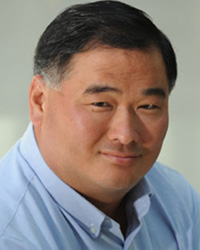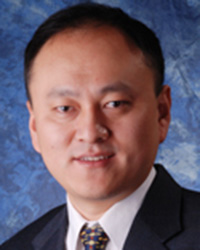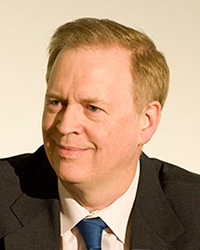Human Capital, Labor Markets and Development
This panel will consider the role of human capital and labor markets in the past and future development of Asian economies. Human capital investments foster development and respond positively to it. Labor markets are central to the development process, in large part because much human capital investment occurs in the workplace and in anticipation of future work.
Event Details
2014
Panel Chair:
Steven J. Davis (University of Chicago)
Panelists:
Chang-Tai Hsieh (University of Chicago)
Hongbin Li (Tsinghua University)
Venue: Acacia Ballroom
Panelists and Moderator
-

Professor Chang-Tai Hsieh
Phyllis and Irwin Winkelried Professor of Economics
Chang-Tai Hsieh conducts research on growth and development. Hsieh has published several papers in top economic journals, including "Misallocation and Manufacturing TFP in China and India," in the Quarterly Journal of Economics; "Relative Prices and Relative Prosperity," in the American Economic Review; "Can Free Entry be Inefficient? Fixed Commissions and Social Waste in the Real Estate Industry," in the Journal of Political Economy; and "What Explains the Industrial Revolution in East Asia? Evidence from the Factor Markets," in the American Economic Review.
Hsieh has been a visiting scholar at the Federal Reserve Banks of San Francisco, New York, and Minneapolis, as well as the World Bank's Development Economics Group and the Economic Planning Agency in Japan. He is a Research Associate for the National Bureau of Economic Research, a Senior Fellow at the Bureau for Research in Economic Analysis of Development, a Co-Director of the China Economics Summer Institute, and a member of the Steering Group of the International Growth Center in London.
He is the recipient of an Alfred P. Sloan Foundation Research Fellowship, Smith-Richardson Foundation Research Fellowship, and the Sun Ye-Fang award for research on the Chinese economy. -

Mr. Hongbin Li
C.V. Starr Chair Professor, Department of Economics
Li, Hongbin C.V. Starr Professor of Economics at the School of Economics and Management SEM, Tsinghua University, and the executive associate director of the China Data Center of Tsinghua University as well. He earned his Bachelor degree from China Agricultural University in 1993 and received his Ph.D. degree from Stanford University in 2001. Before joining Tsinghua in 2007, he was professor in the economics department at the Chinese University of Hong Kong. Professor Li was selected the Cheung Kong Scholar by the Ministry of Education of China in 2009 and received the Distinguished Young Scholar Grant from the National Science Foundation of China in 2010.
He won the First Prize on International Essay Competition on the "Income Distribution and Poverty in China" by the World Institute for Development Economics Research in April 2005. He received the Koret Award/Fellowship from 1995 to 1998 as well as the Provost Fellowship in the summer 1996 both from Stanford University. Professor Li currently teaches "Advanced Micro-Econometrics", "Development Economics", "Honors Program-Academic Track", and "Freshmen Seminar".
Professor Li has published extensively in leading economics journals such as JPE, EJ, ReStat, JoLE, JPubE, JDE, JHR and etc. He has received many research grants funded by the National Science Foundation of China, Research Grants Council of Hong Kong and etc.
Professor Li has served on the editorial board of Journal of Comparative Economics and China Economic Review, as well as on the editorial advisory board of China Agricultural Economic Review. He is a research fellow of IZA in Germany and a senior research fellow of J. Mirrlees Institute of Economic Policy Research. He was the associate director of the Center for Economics and Finance at the Chinese University of Hong Kong from 2006 to 2007. -

Steven Davis (Moderator)
William H. Abbott Professor of International Business and Economics; Deputy Dean for Faculty
Steven J. Davis is an applied economist with research publications on employment and wage behavior, worker mobility, job loss, the effects of labor market institutions, business dynamics, industrial organization, economic fluctuations, national economic performance, public policy and other topics.In addition to a basic understanding of the big macroeconomic issues, Davis hopes his students learn "an informed skepticism about data and economic argumentation and an analytical approach that they can apply to business and economic problems in their careers."
Davis is former Editor of the American Economic Journal: Macroeconomics. He is also a research associate with the National Bureau of Economic Research, an economic adviser to the U.S. Congressional Budget Office, a visiting scholar at the Federal Reserve Bank of Philadelphia, and a non-resident visiting scholar at the American Enterprise Institute. Previously, he held positions at the National University of Singapore, Massachusetts Institute of Technology, the Milken Institute for Job and Capital Formation, the Federal Reserve Bank of Chicago, and the Hoover Institution at Stanford University. During a leave of absence, he was vice president in the Competition Practice at CRA International, an economics consulting firm. "This practical experience taught me that there is a market for analytical thinking skills, the hallmark of a Chicago Booth education," he said.
His research has been supported by grants from the Kauffman Foundation, the World Economic Forum, the Marianne and Marcus Wallenberg Foundation, the U.S. National Science Foundation, the U.S. Department of Energy, the U.S. Department of Labor, and several other organizations.
In addition to publication in numerous academic journals, Davis has published in the Chicago Tribune, Financial Times, Los Angeles Times, Wall Street Journal and other popular media. He has made television appearances on CNBC, Fox News Channel, NBC News, and PBS, among others. He has also appeared on various radio shows.
As a young man interested in economic, political, and social issues, Davis concluded that economics offered a powerful set of tools for understanding economic and social behavior. He pursued graduate studies in economics with the intention of "learning how to think." Davis earned a bachelor's degree in economics from Portland State University in Oregon in 1980, and a master's degree in 1981 and a PhD in 1986, both in economics from Brown University. He joined the Chicago Booth faculty in 1985.
- 1

